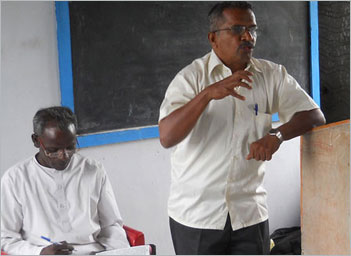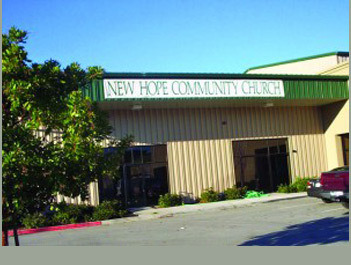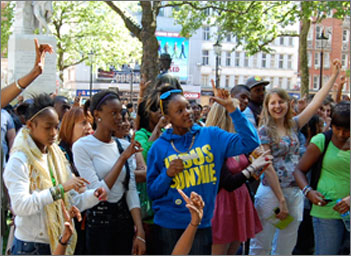By Mike Lutz
BOMBINGS. Beheadings. Mass shootings. Kidnappings. Rocket attacks. Suicide blasts. Has terrorism become the new normal in the world? For some countries, incidents like these have been the norm for far too long.
According to the Global Terrorism Index Attacks have become more deadly with the lethality rising by 26%. The tenth annual edition of the Global Terrorism Index (GTI) reveals attacks are more deadly with 26% more people dying in each incident – the first rise in lethality in five years. We know, all too well, that the US is no longer a stranger to these modern acts of terror, from Manhattan to Boston, Oklahoma City to Sandy Hook, the list goes on, and on, and sadly with the current attack in Israel the world is on edge yet again.
What should a Christian response to terrorism look like?
First, let me say that this is in no way, the be all and end all to the Christian response, but it is a place to start, and sometimes a place to start is all we can handle in those moments.
Pray. It seems like an obvious place to start, but it is not the simplest place to start. Yes, we pray, and in this case we pray for Israel, for the victims, their families, and the nation. We pray for healing and help, for protection and provision. But, we also pray for our enemies. This is where prayer gets difficult, but it is also where it gets uniquely Christian. Jesus said, “Love your enemies and pray for those who persecute you” (Matthew 5:44). He also said, “Do good to those who hate you, bless those who curse you, pray for those who abuse you” (Luke 6:27–28). But how, how do I pray for my enemy when, if I am honest with myself, all I want is payback, revenge, and eye for an eye and a tooth for a tooth.
Here is one way you can pray for an enemy: “Father, grant that my enemy would come under the saving, power of the Gospel and that you would make my enemy part of your family. Grant, Father, that my enemy would love to do your will on Earth as it is done in heaven with the purest of motives and greatest joy. And forgive my enemy his sins, as you bring him to repentance, and protect him from the destructive power of evil.” This is not easy to pray and mean, but it is how Jesus prayed when He said “Father forgive them for they do not know what they do.”(Luke 23:34) And so part of praying for our enemies with sincerity is to pray for ourselves, and for our hearts to be more like Jesus’.
Love. Love is a choice we make. Sure, sometimes love comes with that special “feeling” in our hearts, but biblical love is defined by the choices we make, because love is more than a feeling, true love is backed up by action. Whether it is Israel or some other place where terrorism strikes, our loving response often begins by weeping with those who weep (Romans 12:15). Sharing in the grief of others, as we seek to support them in their sorrow by coming alongside them to use the power of our presence to help with their healing.
Trust. Our trust must be in God and it must remain there. We cannot allow evil to push us off our foundation of faith. Evil is a reality, it has existed from the beginning of creation and it will continue to be a reality until God completely eradicates it with a new heaven and a new earth. Until then, we trust in God’s sovereignty. Trust like this means, confidence in God is not shaken even though evil abounds. Trust that God is still good and will always remain good even though evil occurs. Trust like this means leaning on the absolute reliability and infallibility of God’s Word. Trust like this means maintaining a proximity to God’s presence because apart from a close relationship with God none of this is possible.
Serve. Let’s get practical for a moment shall we. The Christian faith isn’t pie in the sky wishful thinking; it is a practical faith. We are to be the hands and feet of Jesus and that means putting on our boots, rolling up our sleeves, and doing what needs to be done. Donate blood, buy some needed supplies for victims, help at hospitals, give generously, make food for rescue workers, support other volunteers, and donate time, energy, and resources in whatever ways are possible for you. Christians need to be doers instead of spectators.
Fear Not! When we see the horrific images on TV it is easy to become overwhelmed with fear, but we cannot allow fear to rule our lives. “For God has not given us a spirit of fear, but of power and of love and of a sound mind” (2 Timothy 1:7). Simply put, fear does not come from God. The enemy wants us to be afraid and to live in fear, but God wants His peace to guard our hearts and minds (Philippians 4:7). We should take precautions, be mindful of our surroundings, evaluate situations, and respond appropriately, but we must not let fear keep us from living our lives.
When terrorism hits, like it has in Israel, we are angered at evil, and anger is natural and it is an acceptable reaction towards evil, but we must remember that God calls us not to sin in our anger (Ephesians 4:26). These acts of terror are devastating and painful for sure, but the Christian response must be one that seeks to bring help and bring hope. The Christian response must include forgiveness, compassion, and continue to dispense grace. The Christian response to terrorism is one that reflects the nature of God, remembers that we too were even enemies with God before our salvation. Our response must follow the example of Jesus, and it must search the scriptures for instruction, direction, and wisdom.
Mike Lutz is the author of the award-winning books “Jesus Speaking”, a daily devotional based on the words of Jesus and “Jesus Speaking Devotional Prayers.” His works can be accessed at mikelutz.org





















